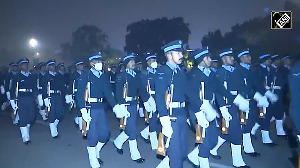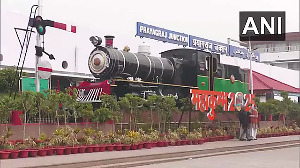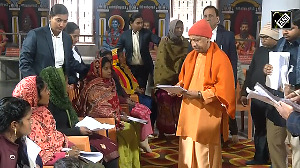In the second of a four-part series, Brigadier Shaukat Qadir (retd) looks at Pakistan's Operation Grand Slam and examines why it failed.
Don't miss our special coverage on the 1965 India-Pakistan War, 40 Years Later. Part I: Operation Gibraltar: Battle that never was Operation Grand Slam was one of a number of contingency plans that had been prepared to support Gibraltar. Many writers have attributed the plan to Zulfiqar Ali Bhutto, which is inaccurate. This was a prepared contingency plan and one that appealed to Bhutto; since he was amongst the favored ministers of the time he might have influenced the choice of the contingency selected, but even if he did, it was militarily the most viable and sensible option.
As an aside, recently Benazir Bhutto has been castigated by some and defended by others for revealing some details of a military plan to rediff.com Whether or not she should have, is another matter, but in defense of General Musharaf it must be stated that what he presented was a contingency plan.
To distort it in a manner as to paint him a war monger is unfair without understanding the contingency. He offers a broad-side with sufficient frequency to pick on one that is unfair.
Operation Grand Slam was four phased; the capture of Chamb, the crossing of river Tawi and consolidation, followed by the capture of Akhnur, and finally severing the Indian lines of communication and capturing Rajauri.
Despite the difficulties of terrain, specially entailing a river crossing, the possibility for success lay in the bold audacity of the plan, which necessitated speed in execution, since if there was sufficient time permitted to the Indians, they would reinforce Akhnur and it would be impossible to capture.
I have said a few words on Major General Akhtar Malik, but these are insufficient. He was a bold audacious commander who remained unruffled under pressure and inspired a confidence in his men, not just the officers but even down to the soldier, that could make them rise above themselves; the epitome of the commander for such a venture.
When the operation was initially planned, GHQ was conscious of the fact that he was commanding an over extended division, which was under immense pressure from the enemy. Despite this, he was chosen to command this offensive. In fact, at most times he was commanding forces greater than 1 Corps, our only corps at that time.
Once again, no record is available as to the causes and I have to again resort to speculation: in my view, apart from the fact that he was the commander most suited for undertaking such an operation, there was also the realisation that there was little he could do to influence events in Kashmir and, since Grand Slam was initially linked to the success and later to the failure of Gibraltar, unity of command may have been a consideration for the achievement of the aim, because of which he was selected to command this operation.
One has also to bear in mind that this was a period when the Pakistan army had only two lieutenant generals, only one of them commanding a corps, Bakhtiar Rana, and the other on deputation to the Central Treaty Organisation, or CENTO, Altaf Qadir, and only a handful of major generals, unlike the present when both are overflowing every conceivable container.
The operation was to commence at 05 am on September 1, but was delayed by a day. It started as planned: Chamb fell within the hour and soon after first light around 7 am on September 2 our troops started crossing the river Tawi.
Operations from here onwards continued with speed and by 1 pm troops had consolidated and were ready to move into concentration areas from which an attack on Akhnur could have commenced well before last light around 3 pm. However we were not destined to get to Akhnur which remained, in the words of Dr Ahmed Faruqui, 'a town too far.'
Akhtar Malik being the kind of person he was, was to be found where the action was. Unfortunately, since his command was of another formation, he also did not have the facility of staff officers. Consequently, he had found little time to communicate with GHQ, which had no idea of the battle situation.
General Musa therefore, flew into Kharian in a helicopter around 11:30 am on September 2 to find out first hand. When he could not discover much more there, he decided to fly towards the border and en route he spotted some vehicles and ordered the pilot to land.
Prior to the commencement of Grand Slam, another offensive division commanded by Major General Yahya had been asked to concentrate at Gujarat to meet any unforeseen contingency. These vehicles that General Musa spotted were those of Yahya and his staff out on a reconnaissance mission. From here Musa managed to establish contact with Akhtar Malik who was ordered to report to the C-in-C Musa. Akhtar Malik found the C-in-C by about 1 pm.
Though the official reason for the change of command of Operation Grand Slam at this stage was that Akhtar Malik could not handle troops from Northern Areas to Kharian, that holds little credence since he was assigned the task knowing that he would be required to handle troops over this stretch.
Ayub has been accused of changing the command so that Yahya got the glory and could be appointed the next chief, but records indicate that this decision was taken by Musa and subsequently ratified through a signal by GHQ.
Consequently, once again I am forced to speculate on the decision taken there to change the command of the offensive and hand it over to Yahya; and I can think of none except that Musa was annoyed at not having been kept informed and had been waiting a few hours.
Once contact had been established, he could well have received an update on the wireless, rather than waste precious time in ordering the successful commander back.
Whatever the reason for changing horses midstream, precious time was lost. It took time for Akhtar Malik to return, time for him to brief Yahya, time for Yahya to assume command, and time for him to understand the situation on ground, before issuing orders. Enough time for Akhnur to be reinforced and never again be attainable by Pakistani troops.
In fairness to Yahya, who has often been accused of this failure, probably any other in his place would have taken as much time and suffered the same fate. Perhaps the troops were also disheartened by the change of command, perhaps even the flamboyant Akhtar Malik would not have been able to get there.
Perhaps if Akhnur had been captured and the Indian lines of communication severed, the Indian attack on Sialkot could never have occurred! Perhaps. But that we will never know.
What we do know is that Akhnur was never captured and this led us into the attack on Lahore and later Sialkot in the wee hours of September 6 1965.
If nothing else, Grand Slam did succeed in releasing pressure on the troops defending the LOC in Kashmir and Northern Areas.
 Since Gibraltar's failure was considered inconceivable, this plan intended to sever the road link between India and Indian held Kashmir once the valley was up in flames. Now that Gibraltar had not just failed but resulted in the loss of some key posts in Kashmir, the operation was undertaken to relieve pressure on the troops defending Kashmir.
Since Gibraltar's failure was considered inconceivable, this plan intended to sever the road link between India and Indian held Kashmir once the valley was up in flames. Now that Gibraltar had not just failed but resulted in the loss of some key posts in Kashmir, the operation was undertaken to relieve pressure on the troops defending Kashmir.






 © 2025 Rediff.com -
© 2025 Rediff.com -